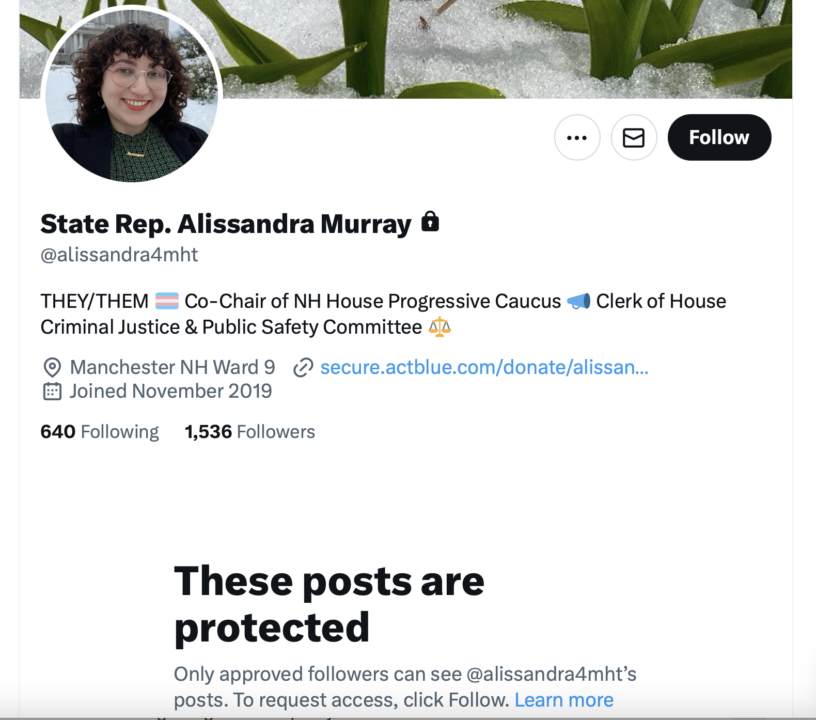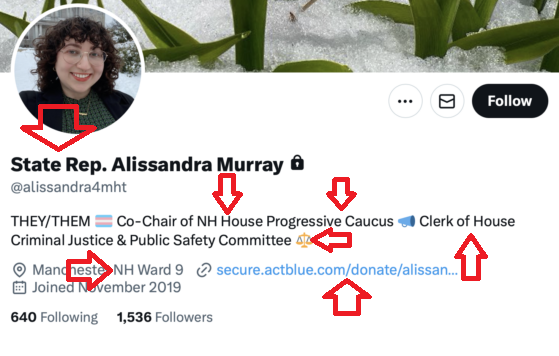I wrote this last year, but with a new session just a few days away, I thought this might be a good time to revisit it. Elected officials who use social media accounts to report on their duties, votes, bills, hearings, or anything similar are setting themselves up to get sued if they block people who engage in these topics.
While it seems unlikely, one of the most frequent complaints I get from readers is elected officials (even in their own party) blocking them (constituents”)on social media. Last April, I “penned” a comprehensive “look” using Rep Allisnadra Murray as an example. Everyone should read it and then decide how they want to proceed.
Originally published April 15th, 2024
Manchester NH House Rep/Lobbyist Alissandra Murray has occasionally attracted the attention of our authors and commenters. Last week, she is reported to have used the block feature on her X account, which is as good a time as any to revisit this.
If you communicate the people’s business there, can you block people whose responses you dislike or with whom you disagree?
According to both circuit court and a unanimous Supreme Court ruling, “officials who post about work-related topics on their personal social media accounts can be held liable for violating the First Amendment rights of constituents by blocking their access or deleting their critical comments.”
Work-related means political communications.
I’ve issued similar warnings in the past that include not just Dems but Republicans and Libertarians. This was inevitable, and this latest 9-0 first amendment decision sets the groundwork. Suppose you discuss your political agenda on measures, bills, issues, or other business of a town, county, state, or federal office. In that case, the public must be able to comment, or you are violating their First Amendment rights.
Rep. Murray, while not the only offender, is using this platform for political communication.
In Murray’s defense, political activity (speech) is not the means by which a potential violation of constituents’ rights is measured. Alissandra is still a free person and citizen with the same rights as the rest of us. She can speak as an individual and is not required to let just anyone engage her content. She could remark frequently and at length on a wide range of topics, especially on groups “owned” and moderated by others, without the moderator being obligated to allow the speech of dissenter others or ensuring they have access to respond.
How do we know the difference?
After a more detailed review, the Court’s standard measures whether “the official both (1) possessed the actual authority to speak on the State’s behalf on a particular matter, and (2) purported to exercise that authority when speaking in the relevant social media posts.”
It seems reasonable to suggest that Murray has no real authority, even as a member of the House Criminal Justice and Public Safety Committee. Still, she does have a vote in both the House body and the committee. The opportunity to speak with authority on matters of interest to the state is not impossible.
This is also true for every other elected or appointed individual, especially at the county or local level, where their position makes them the executor or manager of policy that directly affects citizens and taxpayers.
It is not about whether you think you have authority but whether someone else can convince a court of it; in this case, the safest path is to allow the communication and ignore it or respond to it at your discretion.
In a free society with a First Amendment, your inconvenience (or umbrage) is the lesser concern than the right of others to engage you in political debate on matters where you have influence.
Unless the state can use force (because of the content shared), meaning it violates some existing law or statute (not the ones that exist in your head), my advice is to shut up and take it. I get that this won’t be popular with anyone. Leaving certain content has the appearance of consent or allowing them to use your platform for their speech.
So what?
If you’re right and they are wrong, ignore them. If you can’t do that, prove them wrong or get a proxy to engage them and move along. If they are unhinged, screen grab it, put it in a folder, and use it against them or the people they support.
Blocking people may not explicitly violate their First Amendment rights, but it makes you look like an incapable, incompetent coward.
I know, hours in the day. You don’t get paid to deal with this crap, but Alissandra does. She gets paid a salary by a third-party activist group.
She’s just being a coward.
Note: we are not giving you legal advice. You should not block people – period. If you do, and you’ll have your reasons, that’s on you, should someone (probably annoying, with deep pockets) decide to take you to court on First Amendment grounds.

